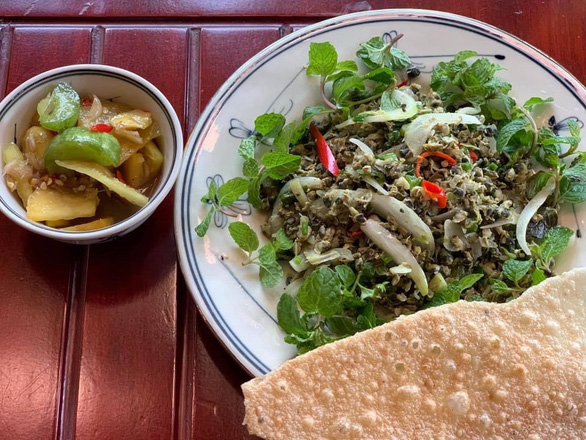Baby mussels, known as hen in Vietnamese, indigenous to Vietnam’s central brackish waters, are important to the local special cuisine.
Rivers run from the legendary range of Truong Son, bringing rich alluvium to the central delta and offering diverse aquatic resources to nurture fishing villages along the riverbanks.
Baby mussels, as tiny as a baby’s fingertips, are the staple ingredient in several local gastronomic specialties.
From Hue specialty…
Simple as it looks, Hue’s com hen (literally translated as baby mussel rice) inherits the expertise of the ancient capital’s culinary arts.
The dish, consisting of two separate bowls of hot broth and rice, gives off a savory smell.
In a bowl, rice is garnished with mint, thinly sliced elephant ear, stir-fried baby mussels, chillies and ground pepper, topped with crunchy pork skin chips and oily fried peanuts.
It is just hard to resist the tempting smell and festive colors emerging from the bowl.
To eat it the Hue way, one has to add a spoonful of broth to the rice bowl, mixing rice and other condiments up before serving.
The first flavorful bite will definitely awaken all of the diner’s senses, making it impossible to stop eating.
Com hen can be found everywhere in Hue, from street vendors to proper eateries.
Besides the original version of com hen, the city’s street cooks offer another variant of bun hen which uses rice vermicelli instead of cooled steamed rice.
…to Quang Nam's simple meals
While Hue’s com hen requires wide ranges of condiments and each has to be cooked in a different way, people of Quang Nam Province serve baby mussels much more simply.
In wartime, Vietnam suffered years of lacking basic necessities. Sweet potato, cassava, ground maize, and coix seeds were main grains while rice was only for the ill.
At the time, baby mussels, rich in protein, became the savior of many families.
Baby mussel broth added with a dash of fish sauce was considered as a treat while stir-fried baby mussels served with grilled rice paper was only for special days.
The dish starts by heating oil in a big pan, frying shallots before adding onion and baby mussels. Fish sauce and ground pepper are added to finish.
A dish of stir-fried baby mussels had to be placed in the middle of the dining table, covered with freshly picked laksa leaves.
The family would use pieces of grilled rice paper to take the food instead of using spoons.
Meanwhile, almost all people growing up in Quang Nam Province’s Dien Ban, Duy Xuyen, Hoi An, Thang Binh, and Tam Ky know how to make baby mussel soup.
Boiling a pot of water, putting veggies and baby mussels in, tasting it with fish sauce and salt – that is how a baby mussel soup is cooked.
Savory and comforting, the dish is for everyone, from children to the elderly.
Along with pickles and steamed rice, it makes a proper, unforgettable meal no matter how many feasts one has in life.
Like us on Facebook or follow us on Twitter to get the latest news about Vietnam!



























